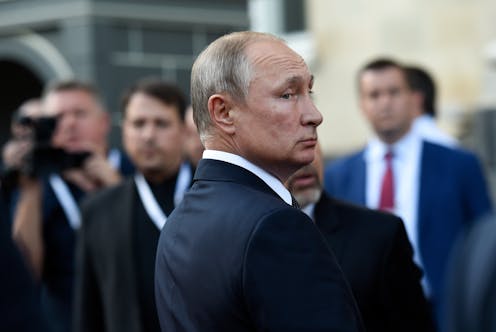
The UK is reportedly planning to officially designate the Russian mercenary firm Wagner Group as a terrorist organisation. This would put Wagner on a list with 78 other groups, including ISIS, al Qaeda and newer white supremacist organisations.
The UK has had lists of “proscribed organisations” for decades, previously including groups in the Northern Ireland conflict, and then creating a more global list in the early 2000s. Once an organisation is listed, it becomes a criminal offence to belong to the group or support the group – with a punishment of up to 14 years in prison. Dozens of other countries have similar lists.
The UK’s proscription of Wagner could be an important global signal – the UK would be among the first to label Wagner a terrorist group. This could encourage other countries to do the same, and possibly discourage countries from working with Wagner in the future.
The home secretary has the discretion to proscribe a group if it is involved in terrorism, defined generally as violence to influence the government or intimidate the public for some political or social goal. The minister takes into consideration both the nature of the organisation, and “the need to support other members of the international community in the global fight against terrorism”.
Wagner appears to have used terrorism in Ukraine and beyond. For example, two men who reportedly worked for Wagner admitted to killing hundreds of civilians, including dozens of children. The group is also implicated in massacres of hundreds of civilians in Mali, according to Human Rights Watch and other non-governmental organisations.
The UK and its allies are supporting Ukraine in its defence against the Russian invasion. As a result, the UK government is within its rights to proscribe the group. But should it? There are some reasons to question whether proscription is the best course of action.
It would be somewhat unusual to include Wagner – a company, a for-profit enterprise – with groups like al Qaeda or Boko Haram, which are motivated by radical ideologies more than profits. For this reason, it seems, the US has labelled Wagner as a transnational criminal organisation, and imposed sanctions usually used on organised crime.
Wagner also stands out because it works for the Russian state, so it is less of a “non-state actor” (and arguably not one at all) than traditional terrorist groups. However, the UK already proscribes a variety of groups that receive state support, such as Hezbollah. Including state actors alongside non-state actors on a terrorist list can blur the distinction of what is a “terrorist”, and open such lists up to endless expansion, but it has been done before.
A symbolic designation
It’s questionable how much of an effect UK proscription would have on a group operating thousands of kilometres away. However, the government has expressed suspicion about Wagner transferring money from the UK after financial sanctions were placed on Russian oligarchs. Such actions would become illegal with proscription. Any support for the group, by any person or institution in the UK, would be criminalised.
Additionally, my own research suggests that proscription can reduce terrorism when the group operates in a country (like Ukraine) aligned with the proscribing state. International cooperation on counterterrorism is essential.
Another study I worked on with Hyeran Jo and Joshua Alley shows that proscription is more likely to be effective when used on groups that depend on funding from private donations, for example from a diaspora community. Making it illegal to associate with or fund a group means their support is quickly eroded, as are their capabilities to carry out attacks. This raises questions about how much proscription would hurt Wagner, which is mostly funded by the Russian state.
Proscription might be a helpful addition to the economic sanctions already placed on Russia. But we shouldn’t expect it to have major financial effects on its own on the group’s activities, since Wagner gets most of its resources from Russia.
More than direct material consequences, proscription could be important for symbolism. Declaring Wagner a terrorist organisation would further signal international disapproval of the Russian invasion, and it would be a mark of shame for Wagner, which is trying to expand its global footprint. Countries like Mali that hire Wagner might look for alternatives if the group is widely recognised as a terrorist organisation.
Negative consequences
It is important to note that there can be negative consequences of terrorist proscription. Scholars have shown that it can make it more difficult to end wars. Governments become more hesitant to make a deal with a legally-designated “terrorist”, and third parties are slow to facilitate negotiations for the same reason. However, this might not directly matter for the Wagner case, since Ukraine would negotiate with Russia, not Wagner.
There are also reasons to believe that proscription can have negative economic effects. Humanitarian organisations have warned that proscription can create a “chilling effect” on charity donors, non-governmental organisations and other important actors who may want to support civilians affected by these situations, because of concern about inadvertently funding a terrorist organisation, or being accused of doing so. The UK government should keep these concerns in mind and try to mitigate negative unintended effects of proscription.
Overall, terrorist proscription might not be the ideal policy tool for Wagner, since the group is a business and not a traditional ideological group. And it’s not clear proscription would affect the group much in the short term, since most of its money comes from the Russian state. However, proscription could be an important global signal, and it could deter potential support for an entity that has clearly used terrorism.
Brian J. Phillips does not work for, consult, own shares in or receive funding from any company or organization that would benefit from this article, and has disclosed no relevant affiliations beyond their academic appointment.
This article was originally published on The Conversation. Read the original article.







